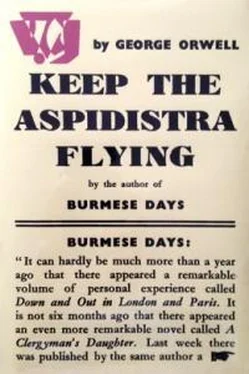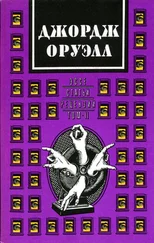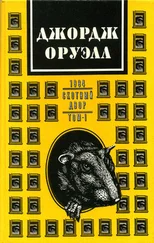Gordon's case came on at half past two, and it was over so quickly that it seemed preposterous to have waited all that time for it. Afterwards he could remember nothing about the court except the coat of arms over the magistrate's chair. The magistrate was dealing with the drunks at the rate of two a minute. To the tune of 'John–Smith–drunk six–shillings–move–on–NEXT!' they filed past the railings of the dock, precisely like a crowd taking tickets at a booking–office. Gordon's case, however, took two minutes instead of thirty seconds, because he had been disorderly and the sergeant had to testify that Gordon had struck him on the ear and called him a ― bastard. There was also a mild sensation in the court because Gordon, when questioned at the police station, had described himself as a poet. He must have been very drunk to say a thing like that. The magistrate looked at him suspiciously.
'I see you call yourself a POET. ARE you a poet?'
'I write poetry,' said Gordon sulkily.
'Hm! Well, it doesn't seem to teach you to behave yourself, does it? You will pay five pounds or go to prison for fourteen days. NEXT!'
And that was all. Nevertheless, somewhere at the back of the court a bored reporter had pricked up his ears.
On the other side of the court there was a room where a police sergeant sat with a large ledger, entering up the drunks' fines and taking payment. Those who could not pay were taken back to the cells. Gordon had expected this to happen to himself. He was quite resigned to going to prison. But when he emerged from the court it was to find that Ravelston was waiting there and had already paid his fine for him. Gordon did not protest. He allowed Ravelston to pack him into a taxi and take him back to the flat in Regent's Park. As soon as they got there Gordon had a hot bath; he needed one, after the beastly contaminating grime of the last twelve hours. Ravelston lent him a razor, lent him a clean shirt and pyjamas and socks and underclothes, even went out of doors and bought him a toothbrush. He was strangely solicitous about Gordon. He could not rid himself of a guilty feeling that what had happened last night was mainly his own fault; he ought to have put his foot down and taken Gordon home as soon as he showed signs of being drunk. Gordon scarcely noticed what was being done for him. Even the fact the Ravelston had paid his fine failed to trouble him. For the rest of that afternoon he lay in one of the armchairs in front of the fire, reading a detective story. About the future he refused to think. He grew sleepy very early. At eight o'clock he went to bed in the spare bedroom and slept like a log for nine hours.
It was not till next morning that he began to think seriously about his situation. He woke in the wide caressing bed, softer and warmer than any bed he had ever slept in, and began to grope about for his matches. Then he remembered that in places like this you didn't need matches to get a light, and felt for the electric switch that hung on a cord at the bedhead. Soft light flooded the room. There was a syphon of soda water on the bed–table. Gordon discovered that even after thirty–six hours there was still a vile taste in his mouth. He had a drink and looked about him.
It was a queer feeling, lying there in somebody else's pyjamas in somebody else's bed. He felt that he had no business there—that this wasn't the sort of place where he belonged. There was a sense of guilt in lying here in luxury when he was ruined and hadn't a penny in the world. For he was ruined right enough, there was no doubt about that. He seemed to know with perfect certainty that his job was lost. God knew what was going to happen next. The memory of that stupid dull debauch rolled back upon him with beastly vividness. He could recall everything, from his first pink gin before he started out to Dora's peach–coloured garters. He squirmed when he thought of Dora. WHY does one do these things? Money again, always money! The rich don't behave like that. The rich are graceful even in their vices. But if you have no money you don't even know how to spend it when you get it. You just splurge it frantically away, like a sailor in a bawdy–house his first night ashore.
He had been in the clink, twelve hours. He thought of the cold faecal stench of that cell at the police court. A foretaste of future days. And everyone would know that he had been in the clink. With luck it might be kept from Aunt Angela and Uncle Walter, but Julia and Rosemary probably knew already. With Rosemary it didn't matter so much, but Julia would be ashamed and miserable. He thought of Julia. Her long thin back as she bent over the tea–caddy; her good, goose–like, defeated face. She had never lived. From childhood she had been sacrificed to him—to Gordon, to 'the boy'. It might be a hundred quid he had 'borrowed' from her in all these years; and then even five quid he couldn't spare her. Five quid he had set aside for her, and then spent it on a tart!
He turned out the light and lay on his back, wide awake. At this moment he saw himself with frightful clarity. He took a sort of inventory of himself and his possessions. Gordon Comstock, last of the Comstocks, thirty years old, with twenty–six teeth left; with no money and no job; in borrowed pyjamas in a borrowed bed; with nothing before him except cadging and destitution, and nothing behind him except squalid fooleries. His total wealth a puny body and two cardboard suitcases full of worn–out clothes.
At seven Ravelston was awakened by a tap on his door. He rolled over and said sleepily, 'Hullo?' Gordon came in, a dishevelled figure almost lost in the borrowed silk pyjamas. Ravelston roused himself, yawning. Theoretically he got up at the proletarian hour of seven. Actually he seldom stirred until Mrs Beaver, the charwoman, arrived at eight. Gordon pushed the hair out of his eyes and sat down on the foot of Ravelston's bed.
'I say, Ravelston, this is bloody. I've been thinking things over. There's going to be hell to pay.'
'What?'
'I shall lose my job. McKechnie can't keep me on after I've been in the clink. Besides, I ought to have been at work yesterday. Probably the shop wasn't opened all day.'
Ravelston yawned. 'It'll be all right, I think. That fat chap— what's his name? Flaxman—rang McKechnie up and told him you were down with flu. He made it pretty convincing. He said your temperature was a hundred and three. Of course your landlady knows. But I don't suppose she'd tell McKechnie.'
'But suppose it's got into the papers!'
'Oh, lord! I suppose that might happen. The char brings the papers up at eight. But do they report drunk cases? Surely not?'
Mrs Beaver brought the Telegraph and the Herald. Ravelston sent her out for the Mail and the Express. They searched hurriedly through the police–court news. Thank God! it hadn't 'got into the papers' after all. There was no reason why it should, as a matter of fact. It was not as if Gordon had been a racing motorist or a professional footballer. Feeling better, Gordon managed to eat some breakfast, and after breakfast Ravelston went out. It was agreed that he should go up to the shop, see Mr McKechnie, give him further details of Gordon's illness, and find out how the land lay. It seemed quite natural to Ravelston to waste several days in getting Gordon out of his scrape. All the morning Gordon hung about the flat, restless and out of sorts, smoking cigarettes in an endless chain. Now that he was alone, hope had deserted him. He knew by profound instinct that Mr McKechnie would have heard about his arrest. It wasn't the kind of thing you could keep dark. He had lost his job, and that was all about it.
He lounged across to the window and looked out. A desolate day; the whitey–grey sky looked as if it could never be blue again; the naked trees wept slowly into the gutters. Down a neighbouring street the cry of the coal–man echoed mournfully. Only a fortnight to Christmas now. Jolly to be out of work at this time of year! But the thought, instead of frightening him, merely bored him. The peculiar lethargic feeling, the stuffy heaviness behind the eyes, that one has after a fit of drunkenness, seemed to have settled upon him permanently. The prospect of searching for another job bored him even more than the prospect of poverty. Besides, he would never find another job. There are no jobs to be had nowadays. He was going down, down into the sub–world of the unemployed—down, down into God knew what workhouse depths of dirt and hunger and futility. And chiefly he was anxious to get it over with as little fuss and effort as possible.
Читать дальше








